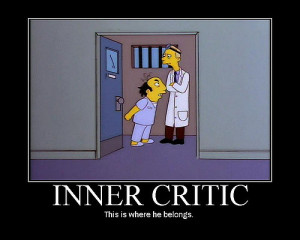If your Inner Critic’s in the driver’s seat, it could steer you away from what you really want in life, including a better career. Seriously!
Coming home last night from dance lessons, it was definitely my Inner Critic at the wheel. Two years ago I finally got up the nerve to begin learning partner dancing (Waltz, Swing, Two Step, etc.). I wasn’t at my best in the lessons and my Inner Critic, who for convenience I’ll call, “Never Satisfied Nellie,” was giving me an earful. “Why are you bothering with those dance lessons? You’re really not that good, and it’s taking up a lot of our time. You shouldn’t be wasting money on this. Those other girls in class are a lot better than you, especially the one in the white top.”
I know. I saw her. I have to agree with you there, Nellie.
She went on. “If you weren’t spending all this time at the dance studio, you could be volunteering at the animal shelter or doing something to help people. Besides, you’re too tall and have no musicality.”
Sigh. So maybe I’m not “Dancing With the Stars” material. Do I always have to be doing something “productive,” Nellie?
For those of you unfamiliar with the term “Inner Critic,” it’s the voice in our head that freely offers unsolicited advice, opinions and directives. As the name implies, it is often critical and full of judgment. It’s all about what you should be doing, not what you want to do. A key element of the Inner Critic is that although it may act like it’s there to help and keep you productive and out of trouble, it will never be satisfied. No matter what you do, your achievements will never be enough and you will never be enough.
I bring up the Inner Critic because it can be a roadblock when you’re trying to make changes in your life and challenge the status quo.
The Inner Critic of a physician seeking career change might sound something like this,
“What makes you think you can be happier in your career? You thought you had a great plan and look where it got you. Most people don’t like their jobs. That’s life. Why do you think you deserve something better? Besides, what else could you do? You don’t have any other skills. You have a family to support. You’re being selfish to want more. You don’t even know how to find other options, so just buck up and be grateful. You’re lucky to have a job where you can help people. Oh yeah, and by the way, have you looked in the mirror lately? It’s not a pretty sight. Better get to the gym!”
With my clients, I use an intake form that asks a lot of questions. There is one question in particular that shows me how prevalent – and off-base – the Inner Critic is:
What negative thoughts about yourself tend to occupy your mind?
The answers are poignant and telling:
I am not good enough
I am not smart enough
I am an imposter, I don’t belong here
Others are always better, smarter, and more capable than I am
I don’t have much to offer
I am not taken seriously or listened to
I am not a good enough doctor, wife, mother, sister, friend, etc.
I am lazy
I make bad decisions
I have wasted so much of my life
I am a failure
No one will hire me, I don’t know how to do anything else
I should have listened to myself
And this is from highly accomplished doctors nonetheless!
All of us can have negative thoughts and feelings about ourselves, especially when we’ve had a bad day or experience. Negative thoughts are pretty common and can come and go. The problem arises when we buy into them and let them limit us.
Here are some steps you can take to deal with the Inner Critic:
Step 1. See if you can characterize your Inner Critic. Does it sound like someone you know, perhaps a critical parent or boss? If you could draw it, what would it look like? A drill sergeant? An over-caffeinated rabbit with a stop watch? A perfectionistic taskmaster? A frowning, disapproving version of you? Personifying the Inner Critic distances you from it and helps you identify when it’s in the driver’s seat.
Step 2. Do a reality check. Is what the Inner Critic saying really true? Are you not smart? Are you lazy? Are you a failure? Do you have nothing to offer? Objectively question what the Inner Critic is telling you.
Step 3. Ask yourself what you really want. Because the Inner Critic jumps in to tell you why what you want is not going to work, and brings up all the what ifs and the potential problems, it’s hard to get very far with a new idea or plan. Write down what you want in a given situation without allowing the Inner Critic to interfere. Give yourself the freedom to explore possibilities free of the Inner Critic’s naysaying.
Step 4. Notice what thoughts bring a sense of peace and calm. The Inner Critic will tend to make you feel anxious, depressed, agitated, disheartened and stressed. When you are listening to yourself (not the critic), you DO know deep down what is best and right for you. Even when you have to admit hard truths to yourself, or make difficult decisions, there is a sense of peace that comes from being in alignment with who you really are and not who the Inner Critic says you need to be.
Step 5. Trust in your own guidance. As you learn to listen to yourself, and not the Inner Critic, you will find your own answers and know that even in the face of uncertainly, you will figure out what to do. Turn up the volume on your own voice, take hold of the wheel, and drop the Inner Critic off at the nearest treatment facility.
And…….keep on dancing!!
Latest Posts
Find what you're looking for:
Popular Categories:
Career Change | Career Enhancement | Job Search | Personal Development
2 Comments
Leave a Comment
























I really enjoyed this topic and recognized myself with this issue. The negative nurses, patients and sometime other doctors just the way they look at you or don’t listen to you……it feeds the inner critic. Overall I am in a position where I am well liked and very thankful for the good co workers I have now. I have however had lots of pain from co workers and patients that don’t get want they want even when we all know it is inappropriate and sometimes illegal! This was a super concept for me, thank you.
Ann,
Thank you for reading the blog and your great comments. You make an excellent observation that we not only experience our inner critic, but the inner critic of those around us and how challenging that can be. I’m glad to hear you have a good environment where you work now, where you’re appreciated and have good relationships with your co workers. This does not just happen, so I am sure you are doing a lot of constructive things to create this positive atmosphere. Thanks again, Heather